Prolific would be an understatement when describing author David Mack’s contribution to the Star Trek legacy. Mack has written 26 novels, 13 novellas and four comic books set in The Final Frontier, with his latest release, Star Trek Legacies, Book 2: Best Defense, as part of Pocket Books “Special 50th Anniversary Trilogy”. While most of the author’s Star Trek work has come over the last 15 years, his writing roots inspired by Gene Roddenberry’s vision of the future stretches back much further, with writing credits on Star Trek: Deep Space Nine episodes “It’s Only a Paper Moon” and “Starship Down”.
Rich Schepis spoke with the author about his Star Trek fandom, his favorite novel and the franchise’s enduring legacy.
Were you a Star Trek fan before you submitted your two scripts and began your novel career in the franchise?
I grew up as a fan of the original Star Trek, watching the show’s syndicated reruns on television in the 1970s. By the time Star Trek: The Motion Picture came out in 1979, I was already sure I would be a Star Trek fan for life.
My first attempts to submit scripts to the show began while I was in college, at NYU’s film school. My parents would tape episodes of Star Trek: The Next Generation for me while I was away at school, and when I came home on holiday breaks I binge-watched the season. Then I spent my summers writing spec scripts that went into the slush pile and earned rejections.
As far as what made me love the series, I think a big part of it is the fact that it celebrates such values as intelligence, compassion, integrity, and loyalty. It offers such a promising vision of humanity’s possible future that it makes me want to believe it could one day become real.
Where do you find the inspiration for your Star Trek novels?
In my need to pay my bills.
More seriously, some of my Star Trek novels have been inspired by real-world political events (for instance, TNG: A Time to Kill); one was born from personal reflections on the nature of mortality and sacrifice (S.C.E. short novel Wildfire); others have sprung from crazy “what-if” questions (e.g., Seekers #3: Long Shot), and others were devised to answer a specific need or request from the editors (most notably, the Star Trek Destiny trilogy).
Often, if an editor asks me for a Star Trek pitch for a particular series of books, I will go back to the canon and look for episodes that left unanswered questions or created situations that might yield unexpected consequences. One such exploration led to the plot of my upcoming Star Trek Titan novel, “Fortune of War”.
Do you have a favorite crew/era to write?
From the canon series? Not really. I’ve enjoyed writing all of them at one time or another. Though I suppose, if pressed to pick a favorite, The Original Series and Star Trek: Deep Space Nine would tie for first place, with Star Trek: The Next Generation a very close second. Voyager and Enterprise would tie for third place.
However, if we open up that question to include the literary-original ships and crews, I would confess that the most fun I ever had writing Star Trek novels was when I alternated writing privileges with Dayton Ward and Kevin Dilmore on the Star Trek Vanguard saga.
What was your favorite Star Trek novel to write?
That’s a cruel question, akin to asking a parent to name their favorite of their children.
If we’re talking about which one yielded the most enjoyable writing experience, I would choose my first full-length Star Trek novel, “A Time to Kill”, simply because the novelty of the effort made it so exciting.
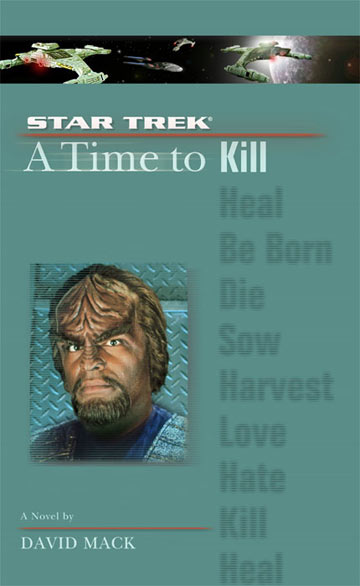
On the other hand, if you’re looking to assess which single novel I think represents my best effort for Star Trek, I would choose Star Trek Vanguard: Reap the Whirlwind. It’s the longest book I’ve ever written for Star Trek, and it’s quite dense and complex — and an unrepentant tragedy, one that serves as the narrative linchpin of the entire Vanguard saga.
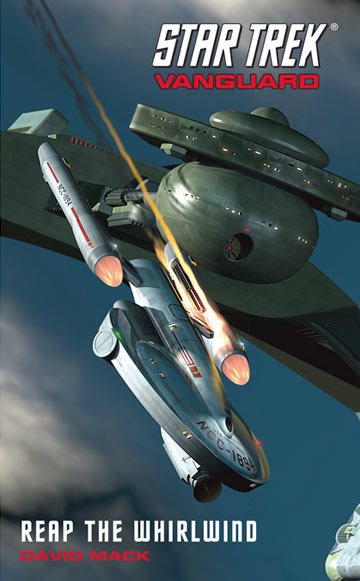
Is there a Star Trek story you would still like to tell that you have not been able to write?
To be honest, not really. I’ve been very fortunate in that I’ve been given the opportunity to write more than 30 Star Trek novels, novellas, short stories, and comic-book tales. Consequently, most of the ideas I was bursting to tell in the Star Trek setting have found their way into print (though I have a few pitches that might yet get resurrected in years to come.)
You wrote a terrific Star Trek comic back in 2001 for Wildstorm, “Divided We Fall”. Would you be interested in writing for that medium again?
Absolutely. I was asked a few months ago by IDW to pitch some ideas for an upcoming Star Trek project there. Nothing’s come of it so far, but we had some good back-and-forth, and I remain hopeful I will get another chance to contribute to the Star Trek comics one day soon.
Why do you think Star Trek endures after more than 50 years?
Because it’s about hope prevailing over despair, about our desire for peace overcoming our impulses toward war. It’s a vision of a future in which all of us matter, and we put aside selfish desires to make a better, cleaner, healthier, happier world — and then venture together into space as a united human race, to see what wonders await. So many science-fiction series revel in showing us the seedy, corrupt, cruel vision of our species’ destiny. Star Trek dares us all to become something better, and it leads by example. I think that’s something many people crave: a reason to get up and go on, a promise that our future will be brighter than our present.
How has writing Star Trek changed you as a person for the better?
Learning to think like the heroes of Star Trek has, over the course of decades, made me want to be more empathetic. It has taught me always to ask: “Is there a better way to face this challenge? One that benefits everyone, not just me and those close to me?” Maybe our world would be less screwed up if more people in positions of power and influence learned to ask such questions of their own motives once in awhile.

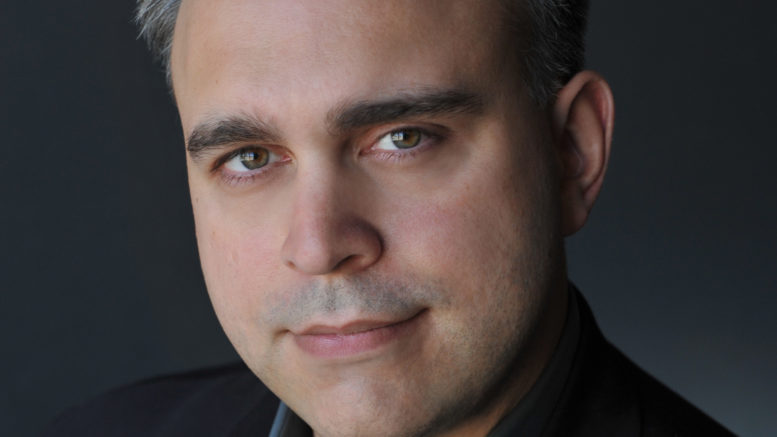

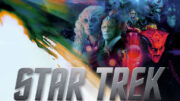

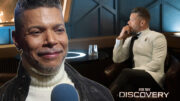
Good interview!
I 2nd that
Yep.
Great interview. Kinda feel like it was barely skimming the surface. I would have liked to see a deeper dive into his novels, especially the Destiny Trilogy. I absolutely loved that story. It was amazing.
David Mack has written some of the best out of all the Trek stories to come along in print. The Vanguard series was excellent and came about as close to gritty and visceral as Star Trek ever has, with original and very believable characters put in hard circumstances and making choices that would have long-lasting and in some cases, haunting consequences. Other than those characters that appear in Vanguard who play later roles throughout the epic saga of Star Trek, you feel that no one is safe. I actually had hoped that when they announced the new TV series would be an anthology, one season would be devoted to telling the Vanguard story. Hopefully somewhere down the line it’ll make it on screen in some format.
I love reading Trek novels, but whenever I see David Mack is the author of an upcoming book, it immediately becomes a must read. His stories are brilliantly written, epic in scope, and th action sequences are so vivid that you could imagine them on screen. Definitely one of my favourite authors of Trek fiction.
Kirsten Beyer is fast approaching as my second novelist in the Trek universe (her Voyager stories are superb). Her addition to the writing team of the new TV series is exciting.
David Mack is a good guy and a great writer. I even had the honor of being a character in one of his novels (things ended rather badly for my character….). He’s the kind of Star Trek novelist who belongs in the writer’s room of a Star Trek series and with Star Trek back where it belongs it’s time to bring him in.
Great interview.
Thank you David Mack for your wonderful contributions to the Star trek legacy. I have read your novels while on deployment and they were a good distraction during a difficult time. Fortunately for me, the FOB I was stationed at had a makeshift freewill library where folks could leave or pick up (keep) books. It is there I found a good number of various Star Trek books and there were some of yours available. Thank you for your writings, they took me away from the ugliness and brought me home.
Good interview indeed.
I hope we get more such interviews from other trek authors as well as authors who were inspired to become writers by watching Star Trek.
The Destiny Trilogy is some of the best Star Trek in any form, TV, Film, or novel.